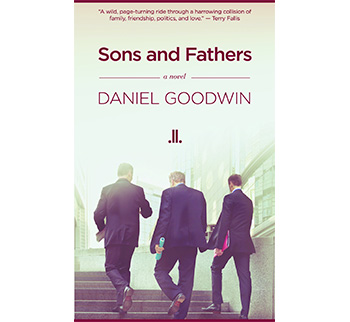It’s rare when we have an opportunity to examine a single event through multiple, disparate lenses or illuminate a singular truth through the refractive light of a multi-faceted diamond. But this is precisely the literary device Daniel Goodwin uses in his recently published novel Sons and Fathers. He tells us a story that revolves around three individuals through each of the men’s distinct voices and unique perspectives.
And he does so to deeply satisfying effect.
The story is absorbing. Most of us are fascinated by the intrigues in the halls of government and Sons and Fathers deals with political crisis at the highest level of government, namely, with the prime minister, his main communications adviser and an enterprising, veteran journalist at a national newspaper.
The prime minister, adviser and reporter are Allan, Eli and Michael respectively. Each grew up in Montreal. Eli and Michael were childhood friends. But at university their friendship evolved into something far less, due to their shared interest in and rivalry for the affection of a beautiful woman. Eli and Michael meet Allan at McGill. Their lives intersect somewhat symbiotically from that point on.
Each man has been profoundly influenced by his father. These fathers hover throughout the novel somewhat like guidance counsellors at a high school who are visited occasionally for advice or assurance by trusting students. The fathers – for good or for ill – have sculpted their sons’ characters and thus, perhaps, are most responsible for steering them toward the destiny that each son then further shapes for himself.
The political crisis creates the tension in the plot. But it also serves as Goodwin’s narrative pretext for exploring the rich veins of political and philosophical reflections, social interactions, the possibilities of language and the ultimate human issues that lie just below the surface.
Each of the three men “speaks” to the reader and shares his particular insights regarding situations and people. But Eli tells the majority of the tale. And the reader is the fortunate beneficiary of Eli’s narrative predominance because it is to Eli that the sheer beauty and poignancy of language mean the most. Eli’s father is a renowned poet who infuses in his son curiosity and reverence for the esthetics of words well used and thoughts meaningfully conveyed.
To be sure, Michael has a sleek facility with words too. But as a journalist, his overarching concern is in the mastery of technique for the purpose of conveying meaning economically and efficiently, and of getting the message out within the unyielding confines of limited page space. Michael’s father is an academic for whom the use of language is the means for recording thought. It is clear that Michael has inherited his father’s utilitarian sense of language.
Allan is a master orator whose embrace of language is through the music and drama of the spoken word. Allan’s father was one of Canada’s most successful and respected federal cabinet ministers. And the son undoubtedly learned a great deal about the spoken word from his father. But Allan’s ability to communicate, to persuade and inspire as a speaker is not the result of studied technique alone. It is the result of the substance of the man’s words combined with the substance of the man himself.
Goodwin spends a great deal of time developing the characters of the three men, writing through their intersecting relationships about life’s sustaining foundations, such as friendship, loyalty, sacrifice, empathy, compassion and love.
However, there are many other pleasing aspects to the book.
Goodwin provides authentic insights to the world of politics and journalism. Borrowing from his considerable experience as a journalist, communications and government relations’ executive, the Montreal-born Goodwin thoughtfully expounds upon the roles and natures – in theory and in practice – of journalists and journalism, of politicians and politics, of ethics and cynicism, and of idealism and pragmatism.
As the elected politician, Allan astutely describes Eli’s desire to work with him as Eli’s “quest to write words that would change people’s lives.” From Eli’s point of view, his motivations are encapsulated in a conversation he had with Allan’s father when both he and Allan were embarking on their careers: “I have integrity. I’m always going to give Allan the best benefit of my professional advice, without regard to what I think he might want to hear, or to what is popular, or to what even he wants to do. I will tell him what is right, both from a pragmatic and from an ethical point of view. My biggest motivation is to do the right thing and do a good job.”
Michael, the journalist, has a different point of view about the successful professional pairing of Eli and Allan. It is his involvement that provides the suspense that grips the reader from the first pages of the book.
It is worthy to note that because the story unfolds in Montreal and Ottawa, the references are, refreshingly, to Canadian iconography. For example, references to the Governor-General’s literary awards, hockey, Don Cherry, Tim Hortons and numerous Canadian historic and literary figures provide the factual and colour background to the story. The cultural and geographic markers in the story are all based on a distinctively Canadian consciousness and sensibility.
But perhaps most gratifying of all is the near sacrosanct place that Goodwin holds for the use of words and the sense of responsibility he feels personally and professionally that writing imposes on the author.
Goodwin recently wrote on one of his blogs: “In many ways, although Sons and Fathers is clearly prose fiction, I see it in part as a bit of a love song to poetry and the role it plays in our lives.”
The author has succeeded in combining this literary effort with an exciting political story.
